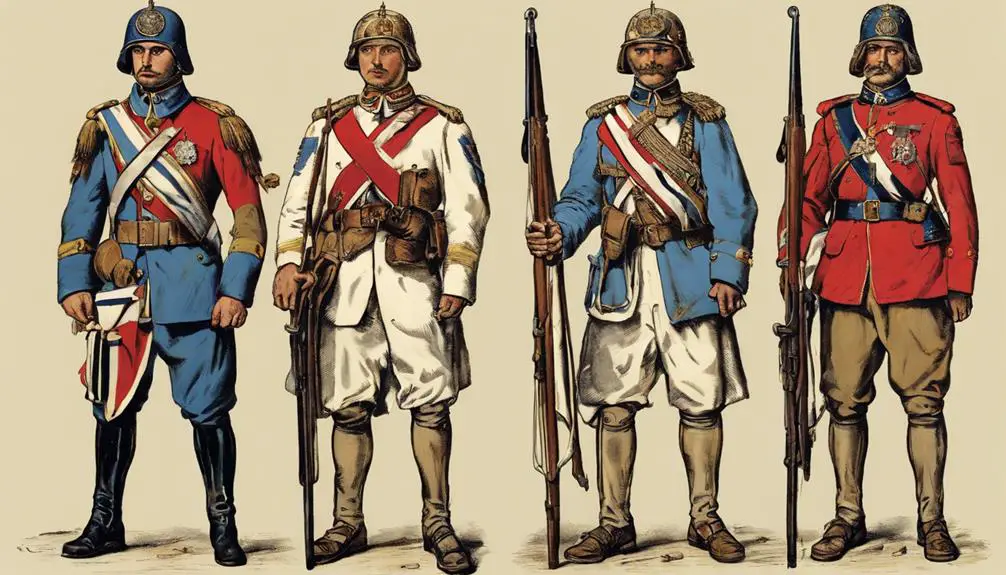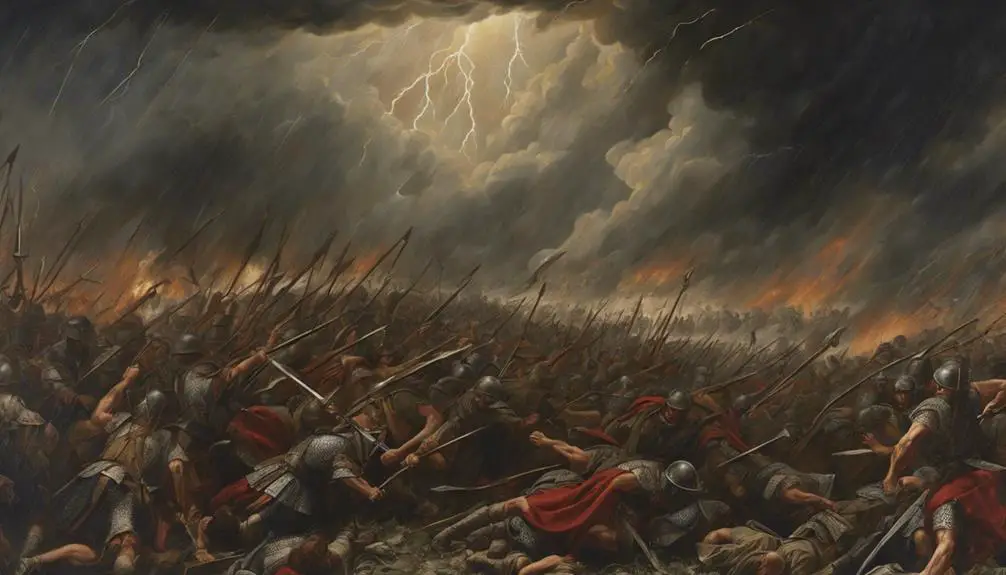Step into an intriguing exploration of the Bible's first war, filled with kings, divine intervention, and lessons of faith and loyalty.

First War in the Bible
You've heard of wars waged for power, wars waged for wealth, and wars waged for territory, but have you considered the first war noted in the Bible?
In Genesis 14, a fascinating conflict unfolds involving a coalition of kings, a nephew in peril, and a mysterious figure named Melchizedek. As you explore this narrative, you'll uncover more than just the details of an ancient skirmish.
You'll encounter timeless truths about faith, loyalty, and divine intervention, leaving you eager to dig deeper into the implications of this significant, yet often overlooked, biblical event.
Key Takeaways
- The First Biblical War saw four kings, led by Chedorlaomer of Elam, battling against five kings of the Jordan River plain.
- Strategic planning, alliances, and psychological warfare were crucial in determining the war's outcome.
- Divine intervention, including causing confusion among enemies and sending natural disasters, played a decisive role in the war.
- The conflict teaches us about the importance of strategic alliances, faith, and the influence of external divine factors on war outcomes.
Context of the First Biblical War

To fully understand the first war mentioned in the Bible, it's crucial to delve into the context in which it took place, considering the sociopolitical climate and cultural norms of the era. You'll find that the ancient Near East, which serves as the backdrop of this event, was a melting pot of various cultures, each with its own unique set of beliefs and practices. These cultural influences, coupled with the struggle for territorial dominance, often ignited conflicts.
Next, you must consider the historical accuracy of the account. The Bible, being a religious text first and foremost, mightn't prioritize historical precision in the same way as an academic text would. However, archaeological findings and historical records can provide corroborating or contesting evidence to the biblical narrative.
Lastly, it's worth noting the role of divine intervention in the biblical war narratives. They're often depicted as battles not merely between men or nations, but between gods. This can be seen as a reflection of the cultural belief in the divine's active role in human affairs. So, in your analysis, remember to consider these factors to gain a comprehensive understanding of the first biblical war.
Main Belligerents and Allies

Delving into the main belligerents and allies in the first biblical war, you'll encounter a complex network of alliances and rivalries that shaped the course of the conflict. The belligerents' motivations were deeply rooted in territory disputes and power dynamics. Four kings, Chedorlaomer of Elam, Tidal of Goiim, Amraphel of Shinar, and Arioch of Ellasar, were aligned against the five kings of the Jordan River plain, including Bera of Sodom and Birsha of Gomorrah.
The alliances weren't merely arbitrary; they were born out of mutual interests and strategic necessities. Allies' loyalties, though, were often fickle and could shift based on changing circumstances. For instance, the five kings were initially subjugated to Chedorlaomer, but after 12 years, they rebelled, triggering this war.
In this intricate web of alliances, one can't overlook the role of Abram (later known as Abraham), who wasn't an initial belligerent but became a crucial ally for the beleaguered kings of Sodom and Gomorrah. His motivations were personal as his nephew Lot was captured during the conflict. This highlights how personal interests could also steer the direction of such an expansive conflict.
The Battle Unfolds: A Narrative

So, how did this biblical war, with its complex network of alliances and rivalries, unfold? You might imagine a chaotic scene, but in actuality, it was a calculated operation guided by battle strategies. Each alliance had its own approach to warfare ethics, which dictated how they engaged in combat.
The allied kings, keen on exploiting the rivalries among their adversaries, employed divide-and-conquer strategies. This involved isolating weaker factions, attacking them first to weaken the overall enemy strength. They understood that victory didn't solely rely on sheer power, but also on strategic maneuvers and psychological warfare.
On the other hand, the opposing kings, despite their internal rivalries, showed remarkable solidarity in the battlefield. They coordinated their moves, synchronizing their attacks to disrupt the allied forces' formations. Their unified front was an impressive testament to the power of unity, even among the most unlikely partners.
It's essential to note that despite the brutality of the war, both sides maintained a semblance of warfare ethics. They avoided unnecessary destruction, focused on combatants, and respected the lives of non-combatants. The first war in the Bible, therefore, wasn't just a primitive clash; it was a complex affair involving strategy, ethics, and alliances.
Divine Intervention and Outcome

In the midst of this strategic warfare, divine intervention played a pivotal role in determining the war's outcome. You'll see that it wasn't solely the strength of the warriors or the shrewdness of human tactics that led to victory. Instead, it was a supernatural strategy that ultimately brought about the miraculous victories we see recorded in the Bible.
This divine intervention wasn't haphazard or whimsical. It demonstrated a well-orchestrated plan, in perfect alignment with God's overall purposes. It's clear that these interventions weren't just about winning a physical war, but about advancing a spiritual agenda.
In one instance, God caused confusion among enemy ranks, leading to self-destruction. In another, He sent natural disasters as a form of divine artillery. These supernatural strategies were so effective that they often left the enemy powerless and the victors in awe, attributing their success not to their own prowess, but to God's miraculous intervention.
Lessons From the Biblical Conflict

Drawing lessons from the biblical conflict, you'll find that these ancient wars offer profound insights into strategic planning, faith, and the power of divine intervention. The biblical narrative doesn't just recount tales of conquest, it also lays out War Ethics, which you can discern by scrutinizing the actions of the warring factions.
Battles were never frivolous; they were waged for a purpose, often tied to survival or divine directives. Hence, setting clear, moral objectives remains a crucial aspect of any conflict. Here, you'll also find a lesson in selecting allies, as seen in Abraham's strategic alliance with his trained servants and neighboring chieftains.
The Spiritual implications are equally profound. Faith played a central role in these conflicts. The warriors' belief in divine backing often determined their morale and, consequently, the outcome of the battles. This underscores the importance of conviction and morale in any endeavor.
Moreover, the divine intervention seen in the first biblical war teaches the pivotal role of external factors, beyond human control, in determining conflict outcomes. It's a reminder that, despite meticulous planning and strategy, there are elements you can't control; a lesson as applicable today as it was then.
Frequently Asked Questions
What Were the Long-Term Impacts of the First War in the Bible on Future Biblical Events?"
The long-term impacts of this particular war had significant influence on future events.
You'll see the establishment of war ethics, shaping how conflicts are approached.
It also solidified the concept of divine intervention, which played an integral role in subsequent narratives.
It's important to note these impacts weren't isolated, but rather, they continued to shape and influence future actions, decisions, and beliefs, setting a precedent for future biblical events.
How Did the First War in the Bible Influence the Social and Cultural Norms of the Belligerents Involved?"
The war impacted the belligerents' social and cultural norms significantly. It shaped their war ethics, dictating what's acceptable in conflict.
Divine intervention, often seen as a game changer, became a norm, instilling a sense of divine justice and fear.
This war set precedents, influencing their future conduct. So, you see, the ripple effects of a single conflict can deeply influence a culture's norms, possibly for generations.
What Were the Economic Implications of the First War in the Bible on the Belligerents and Their Allies?"
You're examining the economic implications of a historical conflict on the parties involved and their allies. The war strategies applied likely had significant influence on economic structures.
Divine intervention, a key aspect, may have dictated resource allocation, affecting economies.
It's crucial to understand how the war's outcome impacted trade, infrastructure, and labor force.
Thus, this conflict could have led to both economic downfall and potential economic boost, depending on the belligerent's position.
Are There Any Archaeological Evidences Supporting the Accounts of the First War in the Bible?"
In your quest for archaeological evidence supporting ancient warfare accounts, you'll find it's a complex field. Evidence of warfare technology might exist, but it's often difficult to directly link to specific battles.
Divine intervention, as reported in these accounts, can't be empirically proven. So, while there might be artifacts or ruins suggesting the presence of war, they don't conclusively validate the specific events narrated in historical or religious texts.
How Have Different Religious Interpretations and Perspectives Influenced Our Understanding of the First War in the Bible?"
Different religious interpretations and perspectives significantly shape your understanding of historical events. Religious artifacts and prophetic interpretations serve as lenses, often adding layers of complexity.
They can affirm, contradict, or even augment the narrative, depending on the viewer's belief system. The key is to approach with an open mind, respect for alternate views, and a willingness to delve deeper.
This approach enriches your comprehension and opens dialogue for further exploration.
Conclusion
So, you've journeyed through the narrative of the first recorded war in the Bible.
You've met the belligerents, witnessed the battle, and observed divine intervention.
This story isn't just ancient history, it's a lesson in faith, strategy, alliances, and divine providence.
The Bible's first war offers a unique lens through which to view human conflict and divine intervention, providing valuable insights for both the faithful and the curious.



Sign up